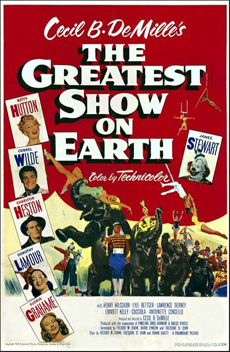The movie also won the Oscar for Best Writing for screenwriters Fredric
M. Frank, Theodore St. John and Frank Cavett. It tells the behind-the-scenes
story of Ringling Brothers, Barnum & Bailey Circus, following the
show on its summer tour, where love affairs, accidents and crime add
to the excitement. DeMille purchased the rights to use the circus title
and facilities for $250,000, then spent two months touring the Midwest
with the circus, collecting anecdotes, slang and behind-the-scenes ideas.
He also advised the writers to watch the German film Varieté
(1925) for inspiration.
Throughout, the film blends actual scenes of circus performers working
and performing with fictional behind-the-scenes vignettes. While the
circus acts are usually fascinating, the lengthy scenes of the tents
being put up and struck, the train cars being loaded and pulled out,
accompanied by florid narrative, seem out of place.
The grandness of the production must have impressed contemporary audiences,
who might have watched circuses but had never seen it from all angles.
Sadly, I had to watch it in pan-and-scan format, since a widescreen
copy was not available from Blockbuster.com.
Charlton Heston, as circus manager Brad Braden, glowers through most
of his scenes, in typical Heston tough-guy mode. No wonder his long-suffering
girlfriend, Holly (Betty Hutton), accuses him of having sawdust in his
veins. Heston, legend has it, won his role with a particularly manly
wave. He was driving through Paramount Studios when he spotted DeMille,
whom he'd never met. Heston waved, and DeMille was so impressed that
he made inquiries leading to Heston being cast. This was only Heston's
third film.
Hutton as Holly is alternately breathy and composed in her role of
a trapeze artist who longs for glory. She is first jealous of a dashing
new trapeze artist, The Great Sebastian, and then begins to fall for
his charms.
For his part, Cornel Wilde as The Great Sebastian, is convincing as
a charming womanizer whose bravado is ultimately his undoing. At DeMille's
insistence, he and Hutton learned to truly perform the circus stunts
they enacted on screen. This was especially difficult for Wilde, who
had to perform both on the trapeze and the high wire and who was seriously
afraid of heights.
Gloria Grahame, in her role as Angel, an elephant trainer and performer,
had to actually learn to ride an elephant, to be carried in its trunk,
and to allow it to rest its foot an inch from her face. Lucille Ball
was DeMille's first choice for this role, but when she got pregnant,
Grahame replaced her. Paulette Goddard strongly campaigned for the role
but was turned down when she refused to learn the stunts.
Jimmy Stewart, infallibly charming, is perfectly cast as Buttons the
Clown, who continually wears makeup because he's running from a terrible
secret.
Despite the grand circus performances, the most captivating part of
the movie is, indeed, the story. DeMille could have trimmed down the
152-minute running time by cutting back on the heavily narrated sections,
and the story might have had even more impact.
Just as the movie fascinated contemporary viewers by its depiction
of circus life, it will fascinate modern viewers for capturing the impressive
feats of long-gone performers.


